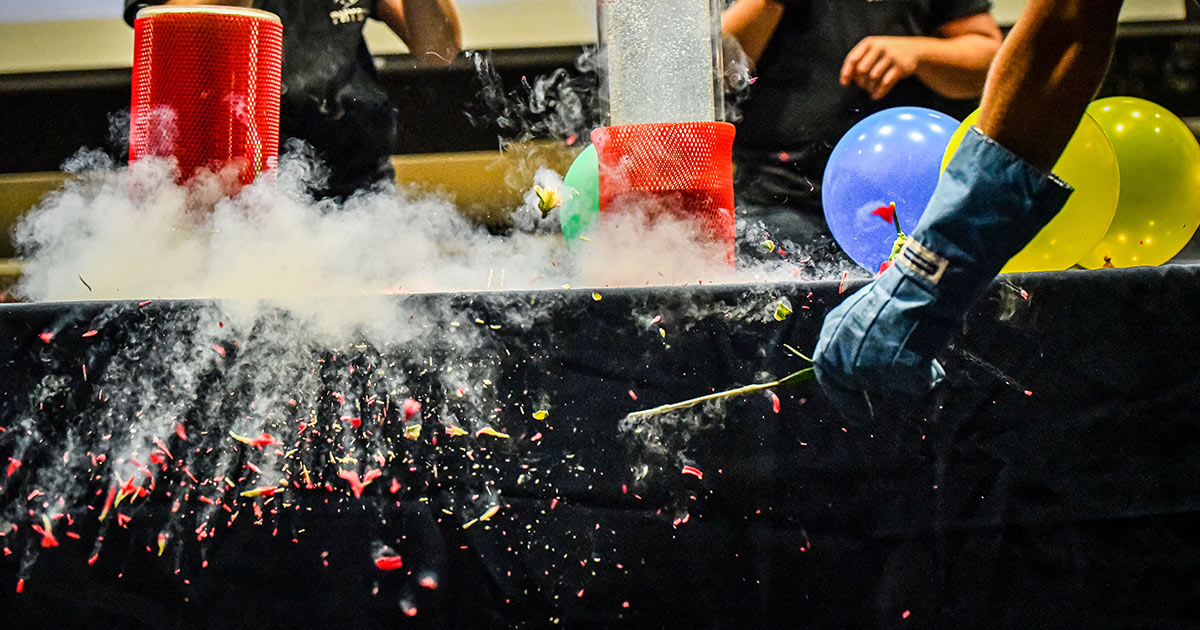The Physics and Engineering Physics Department occupies the north wing of the Brumbaugh Academic Center. Students have access to state-of-the-art scientific equipment, enabling them to conduct high-quality research at the undergraduate level. Student research projects have led to presentations at regional and national scientific conferences, and to publications in peer-reviewed journals.
Equipment Sampling
Department facilities include four large teaching laboratories, 8 smaller laboratories, a machine shop, and a seminar room. The teaching labs are well-equipped for electrical, optical, radiological, and electronic studies, including equipment for spectroscopic and vacuum evaporated thin film studies.
Paul E. Hickes Observatory
Donated by alumnus Paul E. Hickes, class of 1942, the observatory was built in 1986 to house Juniata's Brashear 5-inch refracting telescope. The telescope was purchased from John Brashear, one of the world's most renowned telescope makers at the turn of the last century, prior to the arrival of Halley's Comet in 1911. The observatory was constructed in time for Halley's return 75 years later. Today, the observatory contains a permanently mounted 16-inch reflecting computerized telescope outfitted with an electronic (CCD) camera. Two 8-inch Dobsonian reflectors and a solar telescope are available for imaging or for group viewing. The observatory is available to students in the astronomy class (PC120), and to upper-level students for research projects. It is conveniently located behind Brumbaugh Academic Center.
Sparks Farm Robotic Observatory
In May 2017, a new observatory was constructed at Sparks Farm, a dark-sky property about 40 miles south of Juniata's campus. This roll-off roof observatory holds two telescopes, with room for up to four eventually. It can be accessed remotely from anywhere in the world, and all operations – roof open/close, telescope pointing, image acquisition, etc. – are carried out through a web interface. Operating on every clear night, the Sparks Farm Robotic Observatory greatly increases the amount of data that can be collected to support research into variable stars and asteroids.
Radiation Portal Monitors
The Physics and Engineering Physics Department has two TSA vehicle portal monitor VM-250A pillars – the only undergraduate institution in the United States to have such equipment. These self-contained, weather resistant units each contain two plastic scintillator detectors, an occupancy detector, and an SCA-775 amplifier/controller. The master pillar also has a battery, power supply/battery charger, and an SC-770 system controller and is equipped with RS-232 and Ethernet communications capability. These monitors are equipped to assist in the ongoing national security effort to detect illicit nuclear material at international points of entry into the United States. The monitors are designed to automatically scan vehicular traffic without the need for frequent calibration. They are intended for applications where the relatively low energy emissions from 235U and 239Pu are the main concern. These units support ongoing collaborative work between the Juniata College Physics and Engineering Physics Department and Pacific Northwest National Laboratories (PNNL).
Laser Lab: Optical Tweezers
The term "optical tweezers" describes the action of a single beam gradient-force optical trap. The apparatus at Juniata College uses a 30mW HeNe laser (Helium-Neon, 632.8nm wavelength) to manipulate small objects by applying pico-Newton sized loads. The trap has been used to move mm scale polystyrene beads. Current work is aimed towards studies of the physical properties of macromolecules at the single molecule level, specifically the associated "motor proteins" which drive biological motion at the cellular level.
Machine Shop
The college's Machine Shop, housed within the Physics Wing, is an 800 square foot facility containing woodworking and metalworking tools, including mills, lathes, and drill presses. Students use the Machine Shop in association with work in their courses, and for fabricating parts for public outreach demonstrations and other Society of Physics Students projects.
Physics Lounge
The Physics Lounge is the hub of student activity in the Physics and Engineering Physics Department, and the home of the Society of Physics Students (SPS) club. Students have personal study space in this room and benefit from interactions with their peers, forming personal relationships and friendships in a common environment. When passing by at virtually any hour of the day or night, one will find students studying and helping each other further their understanding of physics.
 skip to content
skip to content





